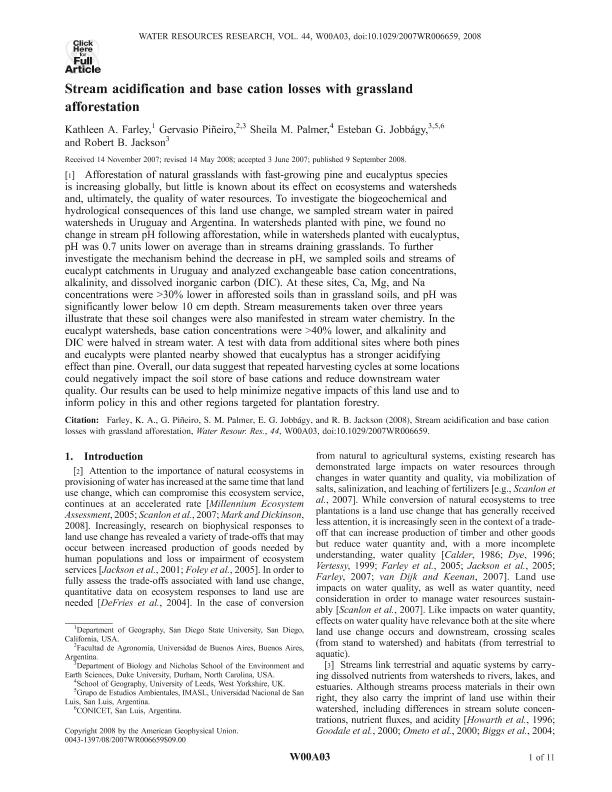Artículo
Stream acidification and base cation losses with grassland afforestation
Farley, Kathleen A.; Piñeiro, Gervasio ; Palmer, Sheila M.; Jobbagy Gampel, Esteban Gabriel
; Palmer, Sheila M.; Jobbagy Gampel, Esteban Gabriel ; Jackson, Robert B.
; Jackson, Robert B.
 ; Palmer, Sheila M.; Jobbagy Gampel, Esteban Gabriel
; Palmer, Sheila M.; Jobbagy Gampel, Esteban Gabriel ; Jackson, Robert B.
; Jackson, Robert B.
Fecha de publicación:
07/2008
Editorial:
American Geophysical Union
Revista:
Water Resources Research
ISSN:
0043-1397
Idioma:
Inglés
Tipo de recurso:
Artículo publicado
Clasificación temática:
Resumen
Afforestation of natural grasslands with fast-growing pine and eucalyptus species is increasing globally, but little is known about its effect on ecosystems and watersheds and, ultimately, the quality of water resources. To investigate the biogeochemical and hydrological consequences of this land use change, we sampled stream water in paired watersheds in Uruguay and Argentina. In watersheds planted with pine, we found no change in stream pH following afforestation, while in watersheds planted with eucalyptus, pH was 0.7 units lower on average than in streams draining grasslands. To further investigate the mechanism behind the decrease in pH, we sampled soils and streams of eucalypt catchments in Uruguay and analyzed exchangeable base cation concentrations, alkalinity, and dissolved inorganic carbon (DIC). At these sites, Ca, Mg, and Na concentrations were >30% lower in afforested soils than in grassland soils, and pH was significantly lower below 10 cm depth. Stream measurements taken over three years illustrate that these soil changes were also manifested in stream water chemistry. In the eucalypt watersheds, base cation concentrations were >40% lower, and alkalinity and DIC were halved in stream water. A test with data from additional sites where both pines and eucalypts were planted nearby showed that eucalyptus has a stronger acidifying effect than pine. Overall, our data suggest that repeated harvesting cycles at some locations could negatively impact the soil store of base cations and reduce downstream water quality. Our results can be used to help minimize negative impacts of this land use and to inform policy in this and other regions targeted for plantation forestry
Palabras clave:
SOIL ACIDITY
,
BASE CATIONS
,
WATER QUALITY
,
EUCALYPTUS
,
PINUS
,
LAND USE CHANGE
Archivos asociados
Licencia
Identificadores
Colecciones
Articulos(IMASL)
Articulos de INST. DE MATEMATICA APLICADA DE SAN LUIS
Articulos de INST. DE MATEMATICA APLICADA DE SAN LUIS
Citación
Farley, Kathleen A.; Piñeiro, Gervasio; Palmer, Sheila M.; Jobbagy Gampel, Esteban Gabriel; Jackson, Robert B.; Stream acidification and base cation losses with grassland afforestation; American Geophysical Union; Water Resources Research; 44; 7; 7-2008; 1-11
Compartir
Altmétricas



